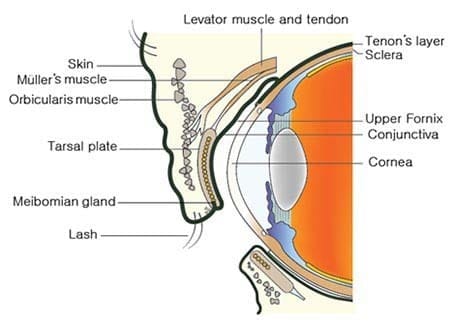 Epiblepharon is a condition characterized by having an extra fold of skin and muscle that pushes against the edge of the eyelid causing the eyelashes to be inverted or turned inward or upward. This can lead to irritation, discomfort and possibly vision problems if untreated. It most commonly affects the lower eyelid but can be seen in the upper eyelid as well.
Epiblepharon is a condition characterized by having an extra fold of skin and muscle that pushes against the edge of the eyelid causing the eyelashes to be inverted or turned inward or upward. This can lead to irritation, discomfort and possibly vision problems if untreated. It most commonly affects the lower eyelid but can be seen in the upper eyelid as well.
The short strands of hair growing at the edge of each eyelid known as eyelashes serve to keep the eye moist and protect the cornea from debris, dust and other outside elements. The highly trained optometrists and pediatric ophthalmologists. Optometrist at the Downtown Manhattan-based Eye Physicians have the knowledge, experience and technology needed to treat epiblepharon and many other eye conditions, such as:
Epiblepharon may be either congenital, which means present at birth, or acquired because of secondary causes.
A combination of factors may contribute to the development of epiblepharon such as:
Acquired epiblepharon may develop in people who have extra folds of skin around the eyelids because of obesity or Downs syndrome and can also develop because of other eye conditions such as thyroid eye disease or orbital tumors. Epiblepharon affects lower lids more often than upper lids but can affect both and usually is seen in both eyes.
Not everyone with epiblepharon experiences symptoms. For those that do experience symptoms, there may be a gritty feeling or a sensation that something is in the eye.
Symptoms of epiblepharon include:
The constant friction of the eyelashes touching the cornea can cause a great deal of discomfort and irritation, which then can lead to almost constant eye rubbing. The eyes may water frequently in an effort to flush away irritants, and the eyelid may appear swollen.
Children who have congenital epiblepharon may find that the condition resolves on its own as the face grows and develops, which usually happens by the age of seven.
If the condition doesn’t resolve on its own, nonsurgical treatment options at your NYC eye doctor’s office include:
When your ophthalmologist diagnoses epiblepharon, regular eye checkups are scheduled to monitor the progression of the condition. If the eyelashes persist in irritating the eyes or if they scratch the cornea, surgery may be recommended.
Epiblepharon is a rare condition and requires the expertise of a highly specialized eye doctor. If you see your child blinking excessively or frequently rubbing their eyes, have them evaluated at Eye Physicians as soon as possible. The earlier it’s addressed, the more likely your child can grow up without experiencing any interruption in visual development.
The goal of surgery is to rotate the eyelashes outward, so they don’t continue to touch the cornea. One option is eyelid everting sutures that uses sutures to fold the lower eyelid downward without an incision.
Things to expect from inverted eyelash surgery include:
There may be a small scar from the surgical incision, but the scar usually disappears as time passes. Any type of eyelash surgery should be performed by a skilled and knowledgeable board-certified eye surgeon.
If epiblepharon is left untreated, eye inflammation and irritation continue, which may lead to frequent infections or recurring bouts of pink eye. It may also lead to more serious complications such as corneal scarring or decreased vision from scarring.
Experienced ophthalmologist diagnoses epiblepharon after a thorough eye exam, which includes examination of the eyelids and eyelashes. With the expertise of team of eye doctors, you can expect them to distinguish this condition from similar conditions, such as trichiasis, which occurs when the eyelashes grow the wrong way.
Other conditions characterized by problems with eyelashes include:
The abnormal growth of eyelashes can also be caused by an injury to the eye from chemicals or burns or from disorders that affect the mucous membranes or skin. Any abnormal symptoms affecting the eyes should be evaluated by an expert in ophthalmology for an accurate diagnosis and the best treatment for healing and relief.
Routine eye exams are important for the health of your eyes. Whether you need an optometrist, ophthalmologist or emergency eye care, the team at Eye Physicians includes experts who provide the best in eye care.
Selecting the right eye care provider is crucial for your family’s eye health. Our clinic offers comprehensive eye care services for patients of all ages. Our experienced team of ophthalmologists and optometrists is dedicated to providing the highest quality care. We use advanced technology for accurate diagnoses and effective treatments. Our personalized approach ensures that you receive the care you need tailored to your specific needs.Your family’s eye health is our priority.
At Eye Physicians, count on top quality eye care for the whole family in downtown Manhattan. Patients are usually in and out in less than an hour, and 24/7 on call support is provided after eye treatments like injections. Contact the team to schedule an appointment today.
Eye Physicians
110 Lafayette St, Suite 503
New York, NY 10013
(212) 292-4814
Entrust the care of your precious eyesight to highly skilled and experienced eye care professionals. For top-notch ophthalmologists and optometrists in Downtown Manhattan, choose Eye Physicians. Eye Physicians ensures prompt care, precise diagnosis, and personalized treatment plans.
Schedule an Appointment